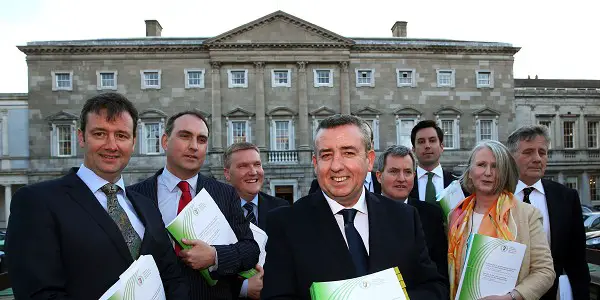Regrets, we had a few.
Ireland’s banking crash inquiry threw up some apologies and the odd sorry too.
Some opted to front-load the pain, get the hardest word out of the way at the start. Others had to have the sorrow leveraged from them.
The most powerful people in the country as the economy careered into a devastating tailspin took turns at what became a well-worn routine over 49 days of public hearings.
Say sorry. Well, sort of. More regret really. Regret at being forced to do as they did. Then spread the blame.
Star witness Bertie Ahern, who led the country towards catastrophe, took some persuasion.
“I did make mistakes, I admit that. But so does everyone who governs,” he said.
The ex-taoiseach went on to qualify his act of contrition: “Of course, I apologise for my mistakes but I’m also pleased that I did get a lot of things right.”
His successor Brian Cowen blamed banks, regulators, the global crisis, the opposition, a lack of power and a lack of choices for the chaos he presided over – but never once blamed himself or his Fianna Fail party.
“I am sorry that the policies we felt necessary to put in place in responding to the financial crisis brought with it hardship and distress to many people,” he offered.
Former tanaiste Mary Harney said she “deeply regretted” her mistakes as second most powerful person in the country. Mostly she regretted not asking “harder questions” of those who were presumably responsible.
Charlie McCreevy, finance minister for years leading to the bust, bluntly stated he would only apologise if he had made any mistakes. “I don’t believe that I did,” he added.
Then the Greens sang the blues.
Former coalition partner and Environment Minister John Gormley absolved his Green Party from any wrongdoing in a mess, he lamented, was not of their making.
“I regret we were forced to make these decisions,” he said.
Ireland’s top government official during the boom upped the ante in the reparation rhetoric.
Dermot McCarthy, chief adviser to Mr Ahern and Mr Cowen, opened up about being “burdened”. But, alas, his regrets too were soothed by his belief that he did his best.
“Like others, I’m challenged by the question as to whether I could have done more to avert the damaging outcomes from the crisis,” he said.
“My regret is tempered only by the belief that I performed my duties to the best of my ability.”
Former bank regulator Patrick Neary admitted the incompetence of the watchdog he headed up.
“The supervisory measures taken by the authority were not sufficient to meet challenges posed by the crisis and the recession that emerged. I am deeply sorry about that,” he said.
Eugene Sheehy, paid more than seven million euro (£5 million) as boss of Allied Irish Banks, said he was “very sorry” for his role in leading the lender into a 21 billion euro (£15.2 billion) citizen-funded bailout.
“That I failed in that responsibility for me is a matter of eternal regret and sorrow,” he told the inquiry.
His predecessor Michael Buckley added: “I deeply regret what happened and the damage it inflicted on the lives of so many.”
Michael Fingleton, ex-chief executive of Irish Nationwide who retired with a 30 million euro (£22 million) pension, claimed he is personally paying the price of the financial collapse.
“I regret very much, I have and I am continuing to pay the price personally as a result,” he said.
“In particular, I regret it for the society’s employees, shareholders and borrowers who all became casualties of the crisis, and I regret it for the taxpayer and the State who have to fund the deficit.”
One of Ireland’s top economists John FitzGerald said he will regret until the day he dies giving an upbeat forecast on the country’s fortunes as it edged over the cliff.
“I’m sorry about it. I regret it. I will regret it till the day I die,” the ex-chief at the Economic and Social Research Institute (ESRI) admitted.
“I feel I did a reasonable job on many others things but on that I did a bad job.”
